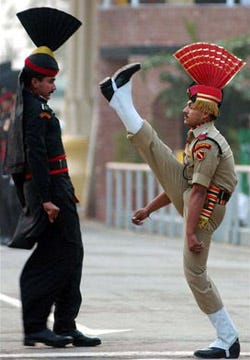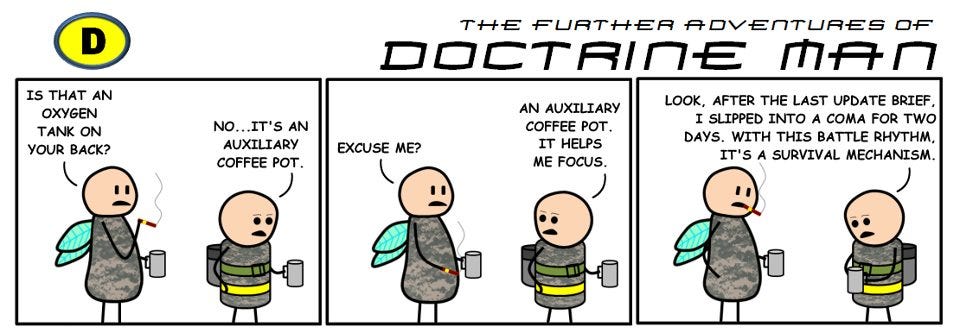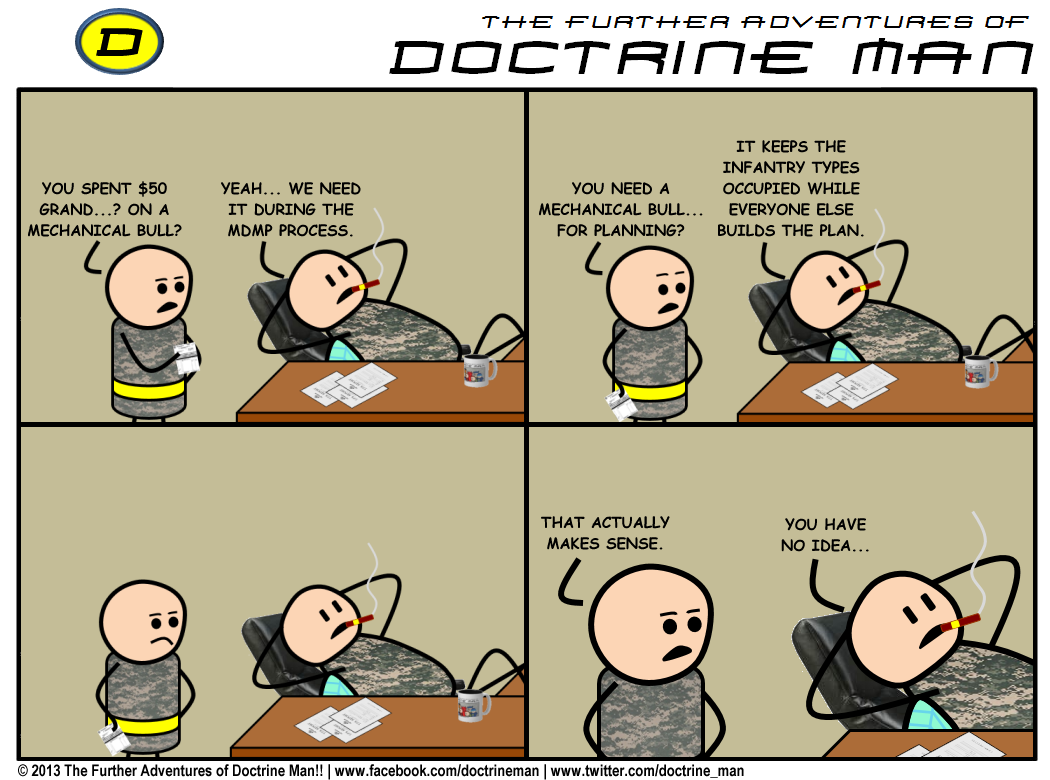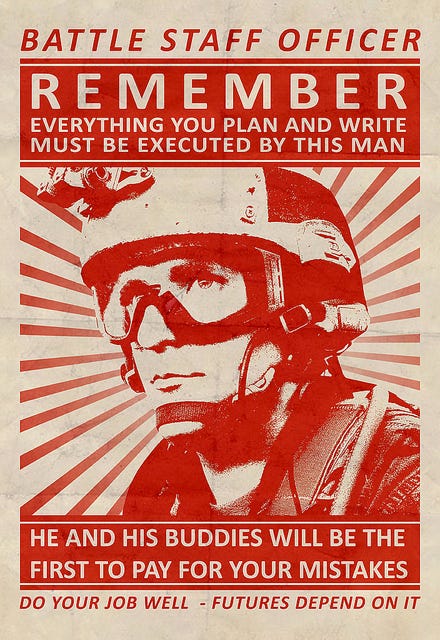10 Lessons for Junior Staff Officers
Congratulations. You've been given the assignment you've dreaded ever since getting drunk at BOLC with a jaded major who told you all about the terrors that lay in being a staff officer. And now you’re facing a year, or two, or three, or an eternity of the damned, on a staff somewhere. Chin up, young soldier, it all comes to us eventually, like death or taxes or door-to-door vacuum cleaner salesmen. Fortunately for you, you’re not the first to blaze the terror-filled trails of the Tactical Operations Center (TOC). Let me guide you with the inextinguishable flame of hate and discontent that lies in the heart of every good staff officer.
 For some reason this was one of the first images on Google when I searched for “Staff officer.” I have no idea what’s going on, but it seems appropriate.
For some reason this was one of the first images on Google when I searched for “Staff officer.” I have no idea what’s going on, but it seems appropriate.
First off, some background. My vast and incomparable knowledge (this is sarcasm, young Padawan, learn it well) comes from serving on the staff of an engineer battalion in Operation Enduring Freedom. We were based out of RC-East, with additional operations in RC-North, RC-Capital, and RC-Southwest. I served as alternately the assistant plans officer and the plans officer, depending on the day, which brings me to my first lesson, young Padawan:
10. Be Flexible
So you’re the Assistant to the Assistant Operations Officer. Cool. Guess what? To the senior officers, you’re merely a new lieutenant who is living and breathing, which means that you get ALL the additional duties. It also means that you’ll get a crash course in doing investigations. It probably also means that you’ll get the honor of being the slide monkey when briefing the commander. But you know what you’re going to do? You’re going to smile, say, “Yes, sir/ma’am,” and drive on, because it’s the only way out of this assignment.
Once you've graduated to a level where they give you responsibilities, you’ll experience the great joys of working for days on a project only to have the parameters change at the last minute by the S-3 Actual. Curtail your desire to smash things, young Padawan. Take a deep breath, make another cup of coffee, throw in another dip, and start over (you’re going to become addicted to caffeine and nicotine, too). Flexibility and adaptability will save your ass in the long-run. Can you bitch about it? Hell yeah. But after the project is over.
9. Keep a Sense of Humor
 As a staff officer, you are required to become obsessed with the Doctrine Man cartoons. They capture our life more than we will ever know. Also, if you’re not following him on Twitter @Doctrine_Man then I don’t know how to fix you.
As a staff officer, you are required to become obsessed with the Doctrine Man cartoons. They capture our life more than we will ever know. Also, if you’re not following him on Twitter @Doctrine_Man then I don’t know how to fix you.
There are military action figures out there for pretty much everything, except staff officers. I think this is a crying shame. Allow me to present to you the figure of the modern staff officer, in all its glory. Clad in a presentable uniform, the staff officer comes with a permanent sardonic smile, which comes from watching the S-3 and XO discuss MDMP and knowing they have no idea what they are talking about. The staff officer also comes with a coffee mug, a never-used M-4 carbine, a laptop, several lego figurines that are used as a stress relief (“My X-Wing shot your Tie Fighter right outta the sky, bro”), a packet of cigs/can of dip, and a backpack full of extra nicotine products and a coffee reserve. This figurine would never sell, but it sure would be accurate.
My point? Keep a sense of humor about yourself. I’ve seen way too many staff officers take themselves too seriously. And no one likes those people.
8. Keep Your Mouth Shut
Hey, you. Yeah, you. I see you there: number one in your class in ROTC, honor graduate of your BOLC class. You look like you are bursting with enthusiasm for this assignment. You’re going to be the new Clausewitz, aren’t you? Nope. Definitely not. You’re a lieutenant aka PFC of the officer corps. You’re not going to institute new doctrine on your first week. Sit back, keep your mouth shut, and learn how the staff works. Learn the dynamics of the staff. Does the S-4 hate the S-6? Does the S-3 never listen to the XO? Why does the S-1 seem to favor the S-2 when it comes to awards and priority of work? Getting to know the staff dynamics will be essential when it comes time to leverage each section to get their full potential. On the other hand…
7. Don’t Be Afraid to Voice Your Opinion
“But, you just said…” I know what I said, young Padawan. Sadly, not everything is black and white. If it were, Clausewitz would've solved war with his maxims and we wouldn't have jobs. Once you have learned staff dynamics, don’t be afraid to talk. Your job, as a member of the commander’s staff, is to evaluate problems and provide the best possible advice to the commander. Which means that you’re going to ruffle feathers sometimes. Don’t be an asshole, but stand up for yourself. Of course, this means that you’re going to end up with your foot in your mouth several times, but pain is a part of life.
6. Know Your Doctrine
 Not really doctrine per se, but a good TTP.
Not really doctrine per se, but a good TTP.
Learn it, live it, love it. Why? Not only will it get you good products but it will allow you to fire for effect on those who sharpshoot your orders or slides. Nothing makes a day better than throwing a paragraph number from FM 6–0 at a sharpshooting major and watching them blush as the rest of the staff giggles. Granted, that won’t do wonders for your career, but it will shut them down; and who needs a career anyways?
5. Get Dirty (Not that kind of dirty, you sicko)
Staff officers have the habit of getting rooted to their desks. I mean literally taking root at their chairs and never leaving. This is a no-no. One of the biggest problems in staff officers is that they often lose touch with reality, i.e. the line units. Since the staff exists to assist the line units, get out of your chair and make some visits. Get down at the unit level, talk to the commanders, NCOs, and joes. Get down in the dirt with the joes. Get a feeling of how things are at the lowest level. Don’t go to second-guess them, go to ask them what they need. If they’re all messed up, then take that back to your boss who can take it to the commander where it can be discussed green-tab to green-tab. No one likes an officious staff officer. But people do like connected and friendly staff officers.
4. Don’t Forget the Field

This. Never. Forget. This.
3. Know Everything
This sounds silly, I know. But it’s a must. Not only do you have to know everything about your particular part of the plan, but you should probably know enough of the other parts to be able to speak on it. Odds are, someone is going to want you to speak on it. If you are in plans and operations, this is even more important. If you can speak intelligently on the details of the plan, the less people will question you, and the more time you will have to goof off by developing more ways to prank the S-1 (piece of clear tape over the chip in the Common Access Card causes amusement for days).
2. Don’t Be Afraid to Challenge Authority
Ah, the big one. So, you’re a lieutenant and you brief three courses of action to the boss, knowing, just KNOWING that one of them is going to get people hurt. You brief passionately and the boss sits there and chooses the one that you dreaded. Heart in your throat, you disagree. Everyone in the room looks at you. The boss considers it again but sticks to his decision. You shut up, with the angry and sick feeling that bad things are going to happen. But you know what? You get to go back to your chu or B-hut and relax with your buddies after this. The boss has to deal with the implications of his or her decision. They own it. You don’t. Deal with it.
But voicing a different opinion is a sign of a strong staff officer. Again, don’t be an asshole (I feel like I should’ve made that into a separate bullet point) but don’t become a yes-man. Odds are, the boss already has enough of those. It is your job to advise the commander, not pander to him or her. So do your job, respectfully. If you know your stuff then the boss is going to appreciate that you are passionate.
1. Talk to People
I wish I could write this in fiery letters across the sky. Or carve it into the walls of West Point. “Interpersonal skills,” it used to be called. I call it just getting along with people. Business people call it “networking.” Whatever you call it, it is the single most important skill to have in the military, whether in the staff or in the line. Being able to work with each of the sections as well as the line units will make developing the plan that much easier. Line units might curse the staff, as is their right, but if you get them involved in the plan then they feel that their interests are being looked out for.
And cooperate with the staff. Go talk to people, don’t email them. Walk down the hall and talk logistics with the S-4. Spend an afternoon with the S-2 learning intelligence capabilities (and learning how to hate DCGS-A). Visit the chaplain and the medical section and get their perspective. At the end of the day, all these people will know your name and know that you have their interests in mind. This makes it easier to have them buy into your plan and present a coherent brief to the boss. Plus, who knows, you might even make a few friends while you’re at it. Misery loves company, after all.
Hopefully, these small bits of wisdom (or tomfoolery, take your pick) will make transitioning to staff just a little less painful. Note that I didn’t mention PowerPoint or spreadsheets even once. You can learn the pains of those on your own.
Lastly, if you are writing orders: be short, be concise, and be to the point. Everyone in the world will thank you for it. Even though they won’t read the order and will instead call you asking for the Cliffnotes version, they will thank you for it.
No comments:
Post a Comment